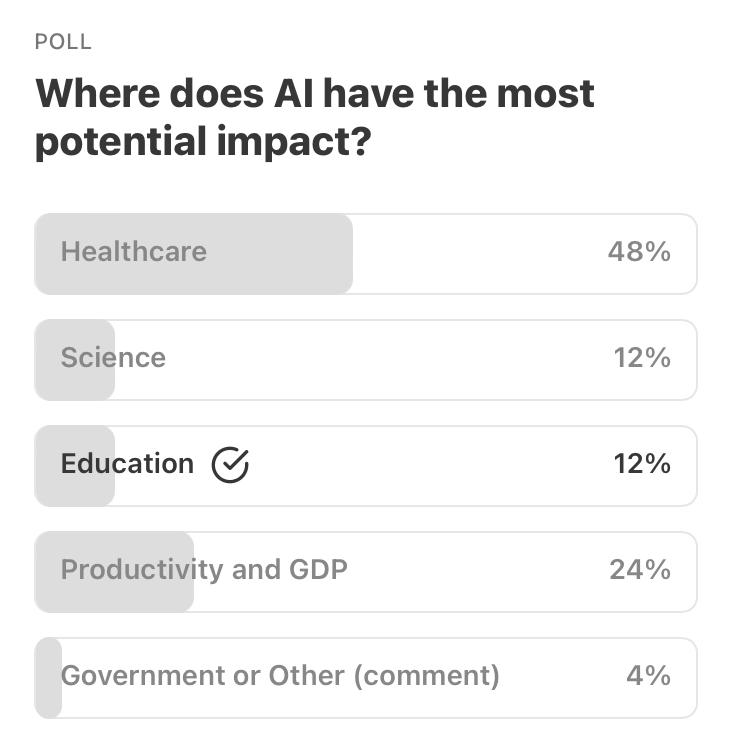
Pondering: Where will AI have the most impact?
I was recently reading an article written on Michael Spencer’s Substack, AI Supremacy about the large impact that AI will have on the Biotech industry. Almost halfway through the article, he posed readers a question in the form of a poll: Where does AI have the most potential impact?
Possible answers were:
- Healthcare
- Science
- Education
- Productivity and GDP
- Government or Other
The results of this poll surprised me. 48% readers determined that Healthcare would be the area most upended, double the next leading category Productivity and GDP.

I chalk up this resounding win for Healthcare to the placement of the poll, deep within an article touting the wonders of medicine in an AI-driven future. The author, Marina T Alamanou, makes a strong case for this future.
However, the poll left me thinking. As you can see, I disagreed with the majority. I’d like to explain why Education, not Healthcare, faces the greatest impact from broad AI adoption.
Defining “Impact”
Depending on who you ask, the noun “impact” could mean different things to different folks. As such, there’s ambiguity that must be clarified. For example:
- Does impact in this context mean solely good outcomes, or does it include bad outcomes too?
- Does impact consider outputs other than simply profit?
- Does impact consider effects on processes, techniques, and procedures used to create industry outputs, and not just the outputs themselves?
I must to distill my interpretation to define my position. Impact, in this case, means (or should mean) more than just the bottom line, and more than just good and bad outcomes. These are important considerations, yes, but impact must also be measured with a consideration to affects on processes used to create outputs.
A brief example, to demonstrate. One measuring the impact of AI on healthcare could measure it simply by noting increases in profit. How much more money do healthcare companies make? However, this is only part of the impact and doesn’t tell the whole story. One could expand the scope of their measurement to include other outputs, such as new drugs on the market. Are healthcare companies treating more diseases with their output of new drugs? This is better, but still lacks. To understand the full picture, one must additionally consider changes to processes used to create outputs. To what extent does AI impact the R&D processes that create safe drugs? Does AI interfere with the scientific method used to find medicinal molecules?
An important factor to consider is the depth to which processes are altered by an innovation such as AI. Impact is minimal if AI utilization can simply accelerate or slot into existing processes. Impact is maximal if AI renders processes entirely useless, in need of total rebuilding. Such rebuilds require the fundamental reconstitution of the industry because it no longer has the same processes, which necessarily means it no longer has the same outputs. This is the crux of my argument.
AI will have far less impact where it can augment processes than where it destroys them. In such cases, impact does not guarantee desirable results. In fact, in destructive cases, many of the initial effects could be negative.
None of the options presented in this poll will face more destruction among its component processes than in Education.
Considering impact on processes for each of our options
Healthcare
As detailed in the AI Supremacy article that spurred this blog, healthcare stands to gain quite a bit from AI adoption. Outputs of both profit and new drugs on the market will serve to grow the industry at an unprecedented pace. However, many of the fundamental processes in healthcare will not be broken by AI, only aided by it. Clinical trials of new drugs will still be required. FDA regulations will keep the shape of drug R&D mostly unchanged. The big difference is the agility by which these processes can be initiated, executed, and completed. This is not a small impact, but it is not industry upending either.
Science
Science falls under a similar umbrella to healthcare. Scientific output stands to gain quite a bit from AI. However, the processes will remain intact. The scientific method will remain dominated by hypothesis, experimentation, and peer review. The difference with AI is that these processes will be faster and more efficient. Whether analyzing data takes 1 month of manual analysis or 4 hours of computer analysis, the analysis will still occur. Science will be impacted, but it won’t be torn apart.
Productivity and GDP
This was an interesting option on the poll since it’s not comparable to the other options. Apples to oranges, if you will. Productivity is not an industry, it’s a tool by which industries and GDP grow. Healthcare, science, education, and government all use productivity. They contribute to GDP.
Since all industries will, in one way or another, be affected by AI, and all industries also contribute to productivity and GDP, the impact on productivity and GDP is theoretically quite large. However, since productivity and GDP are both outputs, not processes, measuring impact in this realm is different and incompatible with measurements of impact in other realms. As a result, I can’t help but ignore this option altogether.
I wonder how the results of the poll would have turned out if this option were not included.
Government
Government is a unique option in that it is under little pressure to adopt AI. It has the freedom to determine when and where it implements AI in ways that avoid negative consequences and maximize the positive. As part of this maximalization, government will naturally seek to augment pre-existing processes in an effort to grow more efficient. However, government also moves very slowly. I don’t think I have to explain that to anyone. As a result of both of these factors, government may face the least impact of all options in the poll.
Education
Finally, we arrive at the option that faces disruption more so than any other option. The processes by which education functions are fundamentally different from the processes in the industries offered in the poll. The root of these differences comes from the practice of ambiguous evaluation. Students are pitted against assessments designed to test their understanding of a particular topic. However, the metric by which they are evaluated, grades, does not measure their understanding. A grade instead measures the instructor’s perception of the student’s understanding as presented by a piece of work (homework, essays, etc.). A student in the current educational model is motivated to achieve the highest grade possible, not to learn the most information. This means that a student’s primary motivation in school is to take the shortest route to present comprehension and earn a high grade. In the current system, the quickest way to present one’s own work as appreciative of a subject is to actually learn and understand the subject. This is not so in an AI-enabled school system.
The introduction of AI adds a significant shortcut to one’s ability to present as competent. Generative AI has the power to answer prompts of many varieties in seconds, without requiring a student to do much, if any, critical thinking. Some of this blame can be placed upon the prompts themselves; surely many of them appear in AI training data, while others were written as a simple prod to disgorge information. That’s a layup for the likes of ChatGPT.
In healthcare or science, if I can detail my hypothesis, perform sound experiments, and publish a study containing groundbreaking research, it doesn’t matter if I used AI or not to help. The contents of my study are still subject to the rigors of peer review by the wider academic community. And should my findings pass this review, new and proven research is still new and proven research, regardless of whether my et al. includes OpenAI. In education, there is an added requirement that work must be solely of one’s own doing. This requirement is incompatible with the future of society featuring AI.
There’s historical precedent for the impact technological advancement has on education too. Consider that education has been forced to remake itself once already in the past three decades after the rise of the internet. New processes to teach computer literacy, detect plagiarism, and build curriculum were all required in short order. Such processes rebuilt the day-to-day activities of all participating parties, far more so than in other industries. The internet increased the speed of knowledge transfer in all realms, but education is the only one where this rapid increase in knowledge transfer overwhelmed the administrators faster than the adopters.
In short, given the machinations of today’s school systems and the differences between them and the healthcare, scientific, and governmental fields, education will be forced to rapidly remake itself once more. The processes that make education possible will be broken, not proven by the broad adoption of AI. Just like with the internet, education will surely act in spite of AI until it is forced to change, a reconstitution of adaptation.